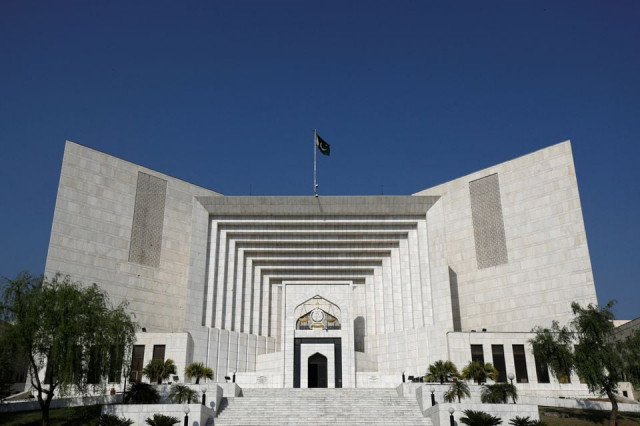SC rules polls trump redrawing constituencies
Apex court issues written order on plea against BHC order

The Supreme Court rules that postponing general elections to address delimitation of the constituencies could lead to a vacuum in governance and a potential crisis of legitimacy, a situation that will be antithetical to the principles of democracy and the larger good of the people.
In its written order on the hearing of petitions against the Balochistan High Court’s (BHC) judgment that annulled the delimitations process of two constituencies in the province, the court says that the holding of general elections far outweighs the need for re-examining the delimitation of a constituency.
The order further says that any intervention by the court in revisiting the contours of delimitation of a constituency done by the Election Commission of Pakistan (ECP) at this stage will open floodgates of similar litigation, resulting in choking the election process.
“Proceeding with this case at this stage when the electoral clock has started ticking, would undermine democracy and adversely affect the fundamental right to vote and form a political government of millions of voters and political workers countrywide,” it said.
Read more: LHC instructs PEMRA to ensure freedom of speech
“The importance of elections in a democracy and the fulfilment of the larger objective of holding a timely election should be given due consideration to ensure that the Court remains within its democratic remit, which in the present case necessitates organizing and conducting of free, fair and timely elections by the ECP,” the written order, authored by Justice Syed Mansoor Ali Shah, adds.
“To us the constitutional importance of holding of general elections in a constitutional democracy as per the election programme far outweighs the need for re-examining the delimitation of a constituency at this critical electoral juncture,” it continues.
“The role of a judge in a constitutional democracy is of a guardian who protects both the Constitution and the democracy. Democracy rests on the sovereignty of the people which is exercised through free and fair elections held on a regular basis.”
On Monday, a three-member bench led by Acting Chief Justice Sardar Tariq Masood and comprising Justice Syed Mansoor Ali Shah and Justice Athar Minallah, declared null and void a BHC verdict that had contested the delimitation of two constituencies.
The BHC had entertained petitions against the delimitation of two provincial assembly constituencies from Sherani and Zhob districts. Responding promptly, the ECP sought recourse to the Supreme Court, seeking to overturn the BHC decision.
The apex court announced that after the election schedule was announced, objections to the delimitation of constituencies would be deemed inadmissible as it cleared the path for the timely conduct of general elections.
Also read: Imran moves IHC against cypher case in-camera trial
In the written order, issued on Wednesday, the bench noted that elections were of central importance without which the government would not be a democratic one, adding that the constituency delimitation did not hold the same immediacy or overriding importance of the general elections.
“Delimitation, by its nature, is a detailed and often prolonged exercise, aimed at creating constituencies that reflect current demographic realities. While this is undoubtedly important for the health of a democratic system, it is not so critical that it should impede the timely conduct of general elections.”
The order underscored that uninterrupted continuation of democratic processes and the assurance of the people’s right to government formation took precedence. Therefore, it said, postponing general elections to address constituency delimitation could lead to a potential crisis of legitimacy.
“Such a situation would be antithetical to the principles of democracy and the larger good of the populace. Therefore, the principle of proportionality and the concept of the larger good demand that general elections be given primacy,” the court says.
On the issues concerning the delimitation, the order called for an approach that ensured continuity of democratic governance and upheld the fundamental rights of the electorate, while still acknowledging the need for eventual and necessary adjustments in constituency boundaries.
“Therefore, if we proceed to adjudicate upon the issue of delimitation … we will invariably upset the timeline of the Election Programme and derail the electoral process already set afoot by the Election Programme announced on 15 December, 2023,” the order emphasised.
The bench held the “considered view that holding of general elections is far more imperative and should be prioritised over the delimitation of constituencies”. It observed that the court laid its hands off this matter for the time being till the general elections were completed.
“We, therefore, suspend the operation of the impugned order and grant leave to appeal to consider inter alia the question: whether in the circumstances of the case, the judicial intervention by the High Court with the delimitation order of the ECP, in its discretionary jurisdiction under Article 199 of the Constitution, was justified,” the apex court order says.
“The ECP shall organise and conduct the election in the two constituencies as per the final delimitation notified on 30 November 2023 and in accordance with the Election Programme notified on 15 December 2023,” it continues.






1724319076-0/Untitled-design-(5)1724319076-0-208x130.webp)












COMMENTS
Comments are moderated and generally will be posted if they are on-topic and not abusive.
For more information, please see our Comments FAQ